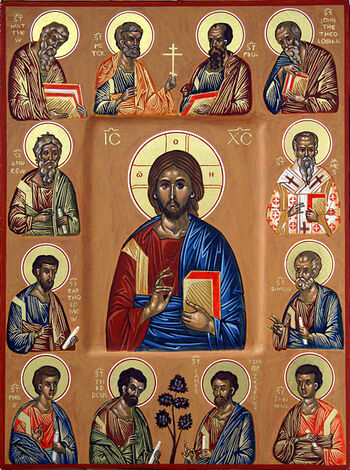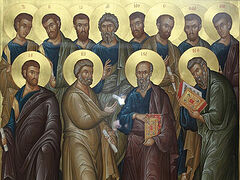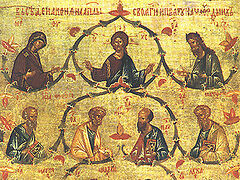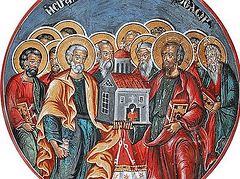1 Corinthians 4:9-16; Matthew 9:36-10:
 Today we commemorate the twelve apostles, looking to them as examples of faithfulness to the Savior. As with many aspects of our faith, we may be so familiar with them that we take their ministry for granted and do not see how their witness has much to do with us. After all, they were our Lord’s disciples during His earthly ministry and did not fully understand Who He was until after His resurrection. Empowered by the Holy Spirit, they then shepherded the Church as they fulfilled Christ’s command to “preach…‘The kingdom of heaven is at hand.’ Heal the sick, raise the dead, cleanse lepers, cast out demons.” They all struggled and suffered greatly in faithfulness to the Lord in their ministries, with St. John the Theologian being the only one not dying as a martyr. That is how they became glorious saints.
Today we commemorate the twelve apostles, looking to them as examples of faithfulness to the Savior. As with many aspects of our faith, we may be so familiar with them that we take their ministry for granted and do not see how their witness has much to do with us. After all, they were our Lord’s disciples during His earthly ministry and did not fully understand Who He was until after His resurrection. Empowered by the Holy Spirit, they then shepherded the Church as they fulfilled Christ’s command to “preach…‘The kingdom of heaven is at hand.’ Heal the sick, raise the dead, cleanse lepers, cast out demons.” They all struggled and suffered greatly in faithfulness to the Lord in their ministries, with St. John the Theologian being the only one not dying as a martyr. That is how they became glorious saints.
If we ever find ourselves thinking that others should praise us for serving Christ, we must look to their example as people who abandoned the comforts of a conventional life to follow a Messiah Who Himself was rejected and condemned by respectable religious and political leaders. The Savior’s message was such a threat to their power that they crucified Him as a public example of what happened to those who got in their way and threatened the order of society. As Christ foretold, “the time is coming when anyone who kills you will think they are offering a service to God.” (Jn 16: 2) It is not surprising that the apostles who continued our Lord’s ministry met deaths like His. They obeyed literally the Savior’s teaching to deny themselves, take up their crosses, and follow Him.
The way of Christ was certainly not popular or celebrated during their lifetimes. To the contrary, it was a path to persecution, imprisonment, torture, and death. In contrast to false teachers who tried to use their position for self-glorification, St. Paul knew that true apostles are like people on death row. They came across as fools wasting their lives in the service of a dead rabbi. They lacked the basic necessities of life, often being hungry, thirsty, and homeless. People often treated them as so much garbage with no human dignity at all.
The way of the apostles was not to respond in kind to their enemies, but to manifest the merciful love of the Savior. Even as He prayed for the forgiveness of those who killed Him and did not respond with violence toward His enemies, St. Paul writes that “When reviled, we bless; when persecuted, we endure; when slandered, we try to conciliate.” The disciples are members of Christ’s Body, the Church, and manifest His ministry as shepherds of the flock. Their work is not their own, but Christ’s. That is why St. Paul could say with integrity “I urge you, then, be imitators of me.” His life had become an enacted icon of the Savior. As he wrote elsewhere, “It is no longer I who live, but Christ Who lives in me.” (Gal. 2:20)
No matter what our particular calling in the life of the Church may be, all who are members of the Body of Christ have the same fundamental obligation to become beautiful living icons of our Lord. People should be able to look at any one of us and see a vibrant image of the healing of the human person in God’s image and likeness that our Savior has worked for the salvation of the world. The apostles are examples for us all in this regard, regardless of the differences between the particulars of their callings and ours. We have the benefit of their examples and of countless saints who have followed in their way, and must not excuse ourselves from faithfully fulfilling our common vocation.
Christ said to the apostles, “You received without paying, give without pay.” All the more does His admonition apply to us, who have received the infinite blessings of the ministries of the Church, not as a reward for good behavior, but purely due to the mercy of our Lord. There is a strong temptation to make our life in the Church all about ourselves, as though God’s salvation were our personal possession to be used for our own comfort and satisfaction. The apostles certainly rejected the temptation to reduce the Body of Christ to an ethnically defined organization that excluded Gentiles. They condemned efforts to make the Church the possession of the wealthy and powerful of this world. They did not compromise the requirements of discipleship in order to give themselves power or to go along with every inclination of the people of their time and place.
Had their religion been something they had invented or earned, they could have done with it as they pleased. Our Lord’s salvation, however, is not a product of this world or a commodity to be divided up or bought and sold according to conventional human designs. He has conquered death, the wages of sin, by His own death and resurrection. We share in His life by grace, which means that we are always in the position of those who have “received without paying.” Consequently, we must “give without pay” and refuse to make our participation in the Body of Christ a matter of serving ourselves or getting what we want. If we are truly in Christ, then His life will become our own; our character will conform to His. He is the vine and we are the branches. (Jn. 15:5) Since He offered up Himself freely for our sake, we must offer ourselves in His Body, the Church.
Across the centuries, countless Christians have done so by following the apostles in literally dying for Christ as martyrs. They have borne witness that the life in Christ has nothing at all to do with a self-serving religion that gives us what we want on our own terms in the world as we know it. Such martyrdom is a particular calling that requires a God-given strength beyond human will power. Dying physically is not, however, the only way to bear witness to our Lord, for there are many ways of giving ourselves freely in obedience to His command to take up our crosses. In order to give up the self-centeredness that so easily corrupts everything from our life in the Church to our marriages and use of time and money, we must bear the cross of devoting ourselves to basic spiritual disciplines, such as prayer, fasting, and almsgiving. These are not reserved only for certain penitential periods of the year, but should always be characteristic of our lives.
How else will we gain the spiritual clarity to discern how the Lord is calling us to serve Him in the Church and in the world? We must mindfully open our hearts to God in prayer each day, tuning out our usual distractions in order to be fully present before Him. We must discipline our appetites regularly so that we will not become slaves of self-indulgence in food, drink, or other pleasures. We must learn to love and serve Christ in our neighbors by being generous with our time, energy, and resources in relation to their needs.
These practices sound simple and easy, but anyone who has taken even small steps to embrace them knows that that is not the case. If we want to follow in the glorious way of the apostles, we must gain the strength to do so by taking the small steps of which we are capable in giving ourselves freely to the Lord in the service of His Church and of the people we encounter every day. We have no lack of opportunities to do so. By responding to those opportunities as best we presently can, we will learn to take up our crosses and take our place among the countless witnesses to the saving mercy of our Lord. We have received without paying. Let us give in the same way.



